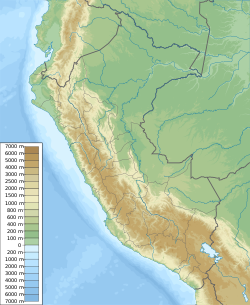Ñusta Hispana[1][2][3] Ñusta Ispanan (also written Ñusta Ispana),[1] previously known as Chuquipalta (possibly from Quechua chuqi precious metal, p'allta plane)[2][4] is an archaeological site in Peru. It is located at Vilcabamba, La Convención Province, Cusco Region.[2]
 Yurac Rumi ("white stone") at Ñusta Hispana | |
| Alternative name | Ñusta Ispanan, Chuquipalta |
|---|---|
| Location | Vilcabamba, Cusco Region |
| Coordinates | 13°6′42″S 72°55′27″W / 13.11167°S 72.92417°W |
| Type | Settlement |
| History | |
| Cultures | Inca |
A carved rock on the site is known as Yurac Rumi (White Rock).[1][4]
Hiram Bingham III discovered the site on 9 Aug. 1911. Bingham noted that the Augustinian monks Friar Marcos and Friar Diego, led their converted natives in burning down the Temple of the Sun, and scorching the rock itself, when Titu Cusi was absent.[5]
Images
edit-
Bath at Ñusta Hispana
-
Nine seats beside Yurac Rumi
-
Sign at Ñusta Hispana
See also
editReferences
edit- ^ a b c Lee, Vincent R. (2013-01-19). Forgotten Vilcabamba: Final Stronghold of the Incas. Kindle Edition.
- ^ a b c "Conjunto arqueológico de Ñusta Hispana". mincetur. Retrieved August 28, 2013.
- ^ "Diccionario: Quechua - Español - Quechua, Simi Taqe: Qheswa - Español - Qheswa" (PDF). Diccionario Quechua - Español - Quechua. Gobierno Regional del Cusco, Perú: Academía Mayor de la Lengua Quechua. 2005.
- ^ a b Thomson, Hugh. (2001). The White Rock. An Exploration of the Inca Heartland. London: Orion Books Ltd. p.310.
- ^ Bingham, Hiram (1952). Lost City of the Incas. Weidenfeld & Nicolson. pp. 100-101, 150-153. ISBN 9781842125854.
